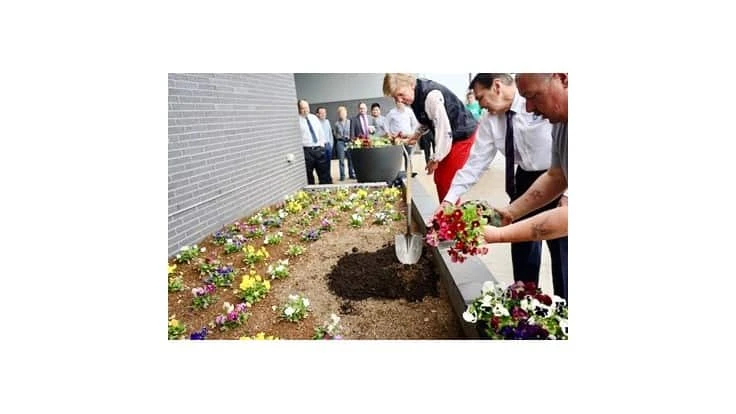
Photo by Ed Brennen, UML.
UMass Lowell (UML) says the composting and recycling efforts taking place at its Lowell, Massachusetts, campus have been honored by Vermont-based Casella Waste Systems with an innovation award.
According to an article posted to the UML website, the university was named an “Innovator of the Year” by Casella for its consistent ability to convert food scraps into compost for campus landscaping to being “the first campus in the Northeast to adopt a system that turns organic waste into renewable energy.”
Casella, which serves as UML’s regional solid waste contractor, says the award is intended to recognize the university for the new and creative ways it sustains and conserves resources and diverts waste destined for landfills.
“We are continuously encouraged to be innovative and to try new ideas,” says UML Director of Sustainability Ruairi O’Mahony. “The fact that we are recognized for that is really reflective of the culture that exists at our university.” O’Mahony also credited UML Chancellor Jacquie Moloney for her commitment to climate neutrality and sustainability.
Working with the Casella Organics division, UML composts food scraps at every dining hall on campus, as well as from its cafes, food courts, the Tsongas Center arena and the UMass Lowell Inn and Conference Center. The university generated nearly 280 tons of compost in 2019 from campus dining halls and its two anaerobic digesters.
The nutrient-rich compost is used in gardens and green spaces across campus, and has been sold to the UML community in a pilot program run by the Office of Sustainability.
UML says it is the first college campus in the region, and second in the country, to install Grind2Energy food waste recycling systems. The Grind2Energy system, made by St. Louis-based Emerson Electric Co., converts food scraps into a slurry that is stored in a 3,600-gallon holding tank. The liquid waste is pumped into a truck and hauled to an anaerobic digestion (AD) facility, where captured methane is converted into energy. The remaining organic material can be used as fertilizer, says UML.
In 2019, the university generated about 280 tons of compost, according to Tianna Begonis, UML’s account manager at Casella.
“A more sustainable world will take many more organizations doing the work that you do, with the commitment that you have all demonstrated,” Casella Chairman and CEO John Casella told UML and six other sustainability award recipients. “Your leadership is important.”
In presenting the award, Casella Associate Brand Manager Abby Marsh also referred to research work on plastics recycling being conducted in the UML Plastics Engineering Department. “UMass Lowell has earned a reputation as an innovator,” she remarked. “They’re always willing to try something new to advance sustainability. We look forward to many more experiments and innovations in the years to come.”
The university’s sustainability efforts also have been recognized by the Association for the Advancement of Sustainability in Higher Education. In its 2020 Sustainable Campus Index, UML ranked fifth in the area of waste reduction among more than 650 higher education institutions worldwide, says the university.
Latest from Waste Today
- Commentary: Battery fires threaten waste management workforce and clean energy transition
- Commentary: The rise of scam listings on waste and recycling platforms calls for vigilance
- New Hampshire lawmakers introduce leachate management bill
- Heritage Environmental Services appoints chief commercial officer
- Ripple Glass launches commercial glass collection program in Atlanta
- Veolia, MassBio partner with GreenLabs Recycling for medical waste plastics recycling
- NWRA, SWANA issue joint response to Bureau of Labor Statistics fatality data
- Former WM executive joins Amp board





